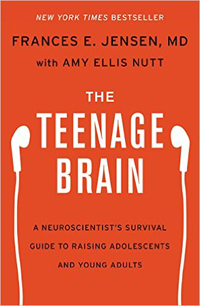 Frances E. Jensen, with Amy Ellis Nutt, The Teenage Brain: A Neuroscientist's Survival Guide to Raising Adolescents and Young Adults (New York: Harper, 2015), 358pp.
Frances E. Jensen, with Amy Ellis Nutt, The Teenage Brain: A Neuroscientist's Survival Guide to Raising Adolescents and Young Adults (New York: Harper, 2015), 358pp.
Any parent of teens will resonate with the challenges and opportunities explored in this carefully researched book on the teenage brain. I read this book for our church book group, and found myself alternately relieved that there are scientific reasons for the unfathomable things that teenagers can do, and terrified by all the possible consequences.
Jensen, chair of the neurology department at the Perelman School of Medicine, University of Pennsylvania, explains that although teens are quick learners, the connections in their frontal lobes are not fully developed, leading to a multitude of complications. Chapter by chapter, she draws on her expertise as a specialist in adolescent brain development to paint an alarming picture of the (often permanent) damage that is triggered by tobacco, sleep deprivation, stress, drugs, alcohol, concussions, all things digital, and eating disorders. Yikes!
In The Teenage Brain, Jensen attempts to write a book that is scientific enough to be credible, but folksy enough to connect with fellow parents. It’s a difficult balance to find, but, for the most part, she succeeds. She justifies the inclusion of brain studies, charts, and even sad stories of teens whose lives went badly awry, as material to open discussions with the young adults in your life. She is relentless with admonitions to talk frankly with your teens.
I do have one minor “bone to pick” with Jensen. Early in the book, she attempts to reassure parents that most teens survive adolescence and go on to productive lives. As proof, she tells how her two sons went on to do advanced degrees in quantum physics and business at prestigious schools like Harvard. That's hardly a representative or reassuring sample.
Overall, this is a valuable and well-written book. It dispels the myth that teenagers are physically and emotionally resilient, and that their brains can easily bounce back from various forms of abuse. In fact, most unhealthy choices are worse for teens than for adults. The book is an excellent springboard for communication with the teens you love.
For an interview with Jensen on NPR's "Fresh Air" with Terry Gross, click here: http://www.npr.org/sections/health-shots/2015/01/28/381622350/why-teens-are-impulsive-addiction-prone-and-should-protect-their-brains


